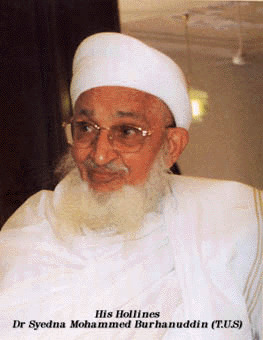|
|
The Dawoodi Bohra Webring |
|
The
DB Ring Not a Member Yet? Members ! ! ! USEFUL LINKS FEEDBACK |
H.H. Dr. Sayyidna Muhammad Burhanuddin (TUS)*
His Holiness Dr. Sayyidna Muhammad Burhanuddin (TUS) (b. AH 1333/1915 AD), is head of the Daudi Bohra community, and fifty second occupant of the office of dai mutlaq ("absolute summoner"). The office held by Sayyidna Burhanuddin originated in Yemen in AH 532/1138 AD soon after the heir to the Fatimid caliphate, the twenty first imam al-Tayyib (AS), chose seclusion: The Ismaili community believes that since then the imamate has continued in seclusion in the progeny of al-Tayyib (AS) and that prior preparations had been made by his predecessors to ensure that the Fatimid Ismaili mission would continue on behalf of the imam in seclusion through dai mutlaq. The dai thus represents the secluded imam and operates with the imam's authority. He carries out virtually all the imam's religious and juridical functions and sustains the social structure of the community of believers. The present dai resides in Bombay, the headquarters of the mission having been transferred to India from Yemen in 1539. Like his predecessors, he is greatly revered by his followers. Sayyidna Burhanuddin received his religious and administrative training during the leadership of his renowned father and predecessor, Sayyidna Tahir Saifuddin (1915-1965) and succeeded him in 1965. He has led his community into an era of fresh vibrancy and renewed religious zeal by devoting his efforts to the preservation of their Fatimid Ismaili heritage in a number of ways: he has ushered in a spiritual reawakening by requiring his followers to adhere closely to Quranic injunctions in their everyday lives. He has emphasized adherence to Islamic business ethics that include the prohibition of interest and institutionalized interest-free loan schemes to cater for the community's borrowing needs. He has strengthened the age-old Shii practice of lamenting the martyrdom of Imam al-Husayn; the annual gatherings to mourn the martyrdom during the first ten days of Muharram ('Ashura') has become the major spiritual expression of the community, with thousands of Bohras attending the sermons of the dai, which are relayed live to Bohra centers all over the world. He has promoted the blending of secular and religious studies by initiating Islam-oriented schools which attempt to provide an integrated education in an Islamic atmosphere. Finally, he has undertaken the restoration of Fatimid relics and promoted Fatimid architecture and design in the construction of a large number of mosques, mausolea, and other public buildings all over the world. The most important of such works has been the monumental restoration in 1980 of al-Jami al-Anwar, the huge mosque built by the Fatimid caliph-imam al-Hakim (996-1021). Sayyidna Burhanuddin is an accomplished scholar. He personally supervises the curriculum of the Arabic academy al-Jamiah al-Sayfiyah where his followers receive religious training. He is the author of several books on Ismaili religious thought and has composed thousands of verses in Arabic on supplication and in praise of the Prophet, imams and dais. He has received honorary doctorates from al-Azhar University (1966) and from Aligarh Muslim University (1966). He has frequently visited Daudi Bohra centers all over the world to personally imbibe Islamic values in his followers, a practice he has continued even at an advanced age. He spends many hours each day in attending to the needs of the Daudi Bohras, who seek his advice on all aspects of life, even on mundane matters such as the choice of name for a newborn. His charitable endeavors, promotion of institutes and trusts for educational and economic welfare, support of projects on environmental issues and renovation activities have earned him international recognition, including the highest civilian honors of Egypt (1976) and Jordan (1981). (Note: To maintain the integrity of this article, the spellings of Islamic names and terms in the original article are retained) * Extract from the Oxford Encyclopedia of the Modern Islamic World, 1995. |
[What is DB! Ring?] [Who Can Join?] [DB! Rules] [Join DB! Ring] [DB! Resource Page] |
|

